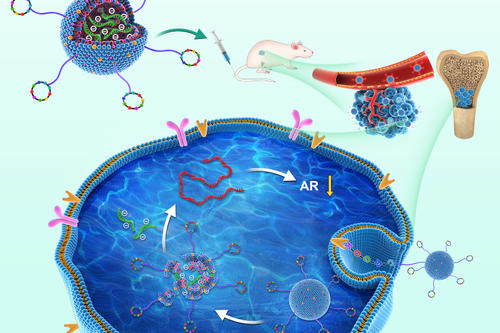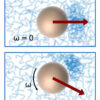Published in the Advanced Functional Materials, University of Minnesota researcher Hongbo Pang led a cross-institutional study on improving the efficacy of nucleotide-based drugs against prostate cancer and bone metastasis.
In this study, Pang and his research team looked at whether liposomes, when integrated with the iRGD peptide, will help concentrate antisense oligonucleotides (ASOs) into primary prostate tumors and its bone metastases. Liposomes are used as a drug carrier system, and ASOs are a type of nucleotide drug.
More importantly, they investigated whether this system helps more drugs across the vessel wall and deeply into the tumor tissue. This is critical because, although nucleotide drugs offer unique advantages in treating tumors and other diseases, they often suffer from a poor efficiency of crossing the blood vessels and entering the tumor tissue, where their targets reside. This problem greatly limits their clinical applicability and efficacy.
“Our system demonstrates a good ability to deliver more ASOs into both primary tumor tissue and bone metastases—which is the primary site for prostate cancer metastasis,” said Pang, an assistant professor in the College of Pharmacy and a member of the Masonic Cancer Center. “This further translates into a significant improvement of ASO efficacy to inhibit the growth of primary tumor and bone metastases. We expect this system to become a universal carrier system, to improve the clinical efficacy of ASOs and other nucleotide drugs.”
The study found that:
iRGD-liposomes can increase the tumor accumulation and vascular/tissue penetration of ASOs against the disease-driving gene of prostate cancer;the ability of ASOs to inhibit the growth of both primary tumors and bone metastases was significantly enhanced by iRGD-liposomes;and, a long-term tumor inhibition study was also performed, showing that iRGD-liposomes significantly prolongs the AR-ASO suppression of primary tumor growth.
Pang and his team say that iRGD-liposomes are proven as a desirable delivery system for ASOs, and hold the promise to improve the clinical efficacy of nucleotide drugs in cancer therapies.
Therapy sneaks into hard layer of pancreatic cancer tumor and destroys it from within
More information:
Jibin Guan et al, iRGD‐Liposomes Enhance Tumor Delivery and Therapeutic Efficacy of Antisense Oligonucleotide Drugs against Primary Prostate Cancer and Bone Metastasis, Advanced Functional Materials (2021). DOI: 10.1002/adfm.202100478
Provided by
University of Minnesota
Citation:
Improving rug efficacy against prostate cancer and related bone growths (2021, April 20)
retrieved 20 April 2021
from https://medicalxpress.com/news/2021-04-rug-efficacy-prostate-cancer-bone.html
This document is subject to copyright. Apart from any fair dealing for the purpose of private study or research, no
part may be reproduced without the written permission. The content is provided for information purposes only.



